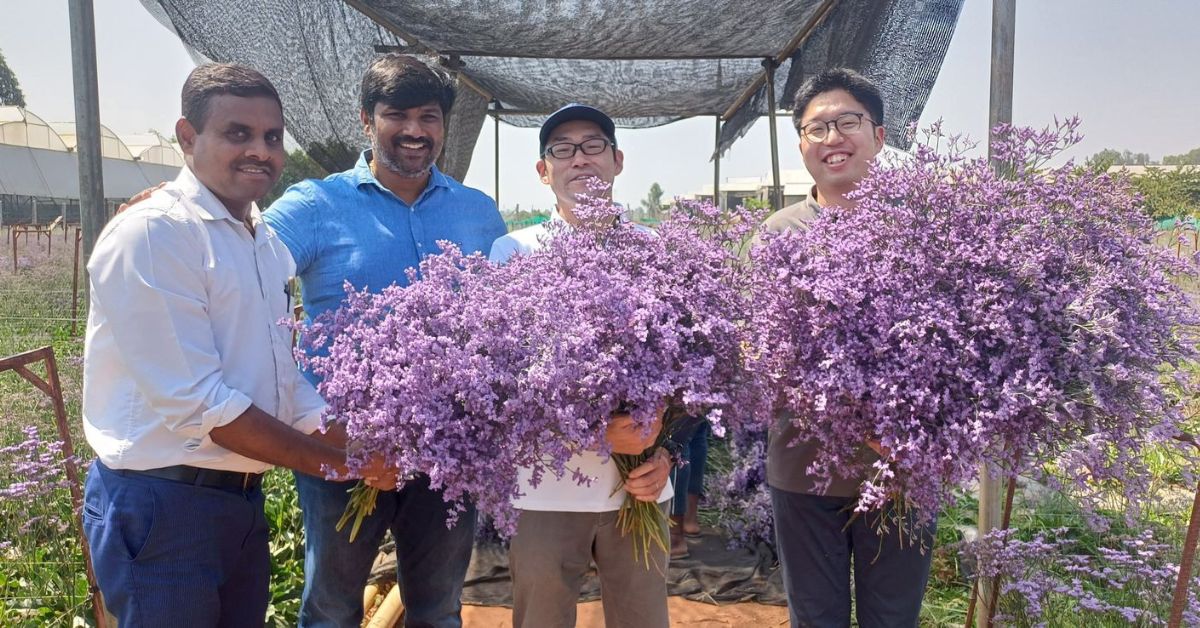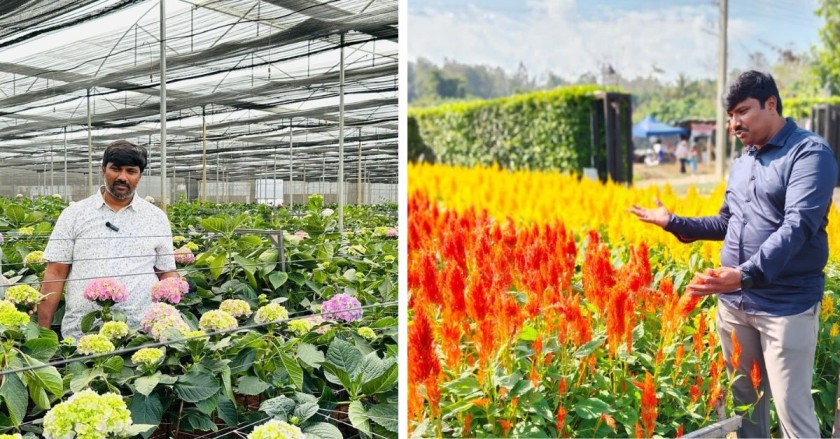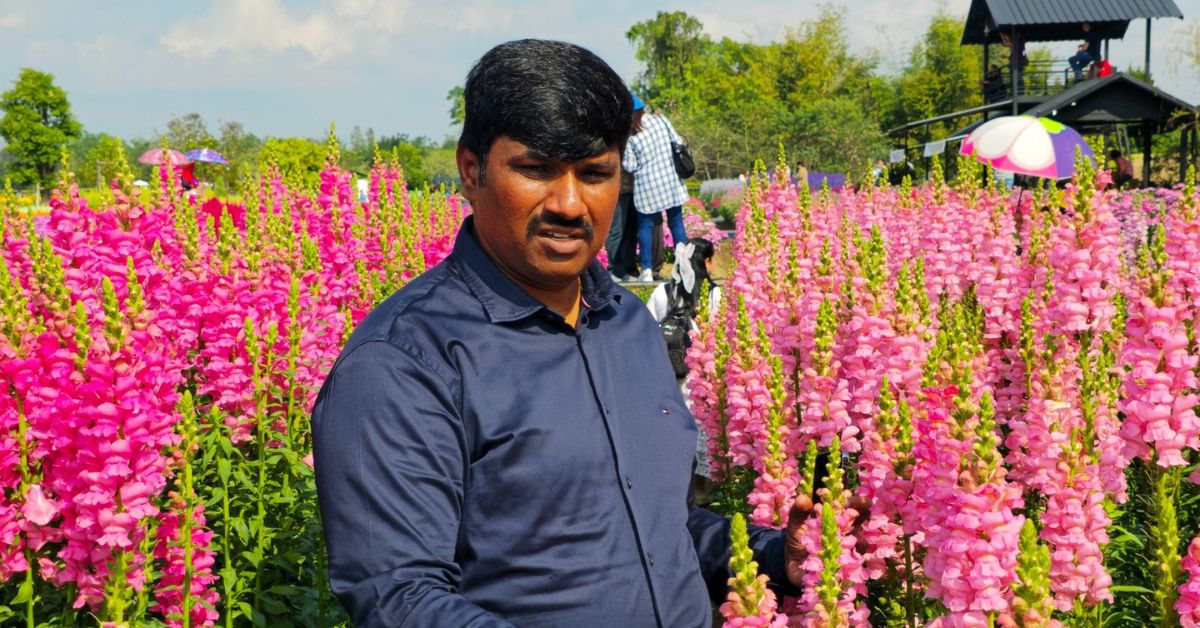Born in a household of conventional farmers, Srikanth Bollapally lived in poverty as a baby. He determined to take a unique route and began rising flowers. At the moment, with a farmland of over 50 acres, he’s incomes crores yearly.
Srikanth Bollapally’s days at the moment are stuffed with the glow of success. Residing in Bengaluru, this flower farmer resides the dream he cherished in his youth.
At 40, Srikanth is reaping important income from his floriculture enterprise. He cultivates 12 forms of flowers throughout his 40-acre farmland close to Doddaballapura, Bengaluru.
With prospects from all throughout the nation, Srikanth earns a turnover of Rs 70 crore in a yr, working with a workforce of greater than 200 folks from throughout rural Karnataka.
Nonetheless, whereas these numbers appear staggering, the street to success for Srikanth was not a mattress of roses.
“I labored for Rs 1,000 per thirty days as a result of I wanted the cash. It was dedication and endurance that led me to the place I’m immediately,” Srikanth shares in a dialog with The Higher India.
So, how did a younger Srikanth forge his approach to success, and how will you enter the floriculture business? Right here’s his story.
Farming in his blood
Born and raised in a household of farmers within the Nizamabad district of Telangana, Srikanth describes his concept of labor to be simply farming.
“In my head, there was no different occupation for me. Farming felt like an apparent option to me,” he says.
Nonetheless, farming didn’t profit the household a lot.
“We have been drowning in poverty and debt. There have been so many challenges with the occupation and really much less income. I needed to get educated however I used to be in school 10 when my mother and father advised me that they will now not fund my schooling,” he shares.
Stricken with poverty, he needed to work to assist the household earnings. “I used to be 16 and needed to begin working. I bought a chance to work with a relative in Bengaluru. We had heard that floriculture was gaining momentum there and I made a decision to hitch the relative,” he says.

In 1995, Srikanth moved to Bengaluru with goals of doing one thing. “Nonetheless, the cash that I used to be being paid was little or no. It was solely a thousand rupees a month, however I had little alternative,” he says.
After working for a yr, Srikanth geared up himself with the methods of the commerce, studying the whole lot from cultivation, harvesting, advertising, and even export of the flowers.
“I might clearly see that there was immense potential within the enterprise and I made a decision to take a leap of religion and do one thing of my very own. Again then, with no monetary assist and little or no financial savings, I began to supply flowers from farmers and commerce them,” he says.
In 1997, he opened a small flower store within the metropolis. “I did that for greater than a decade and was making affordable income. Nonetheless, I had an urge to do extra. I knew there was immense potential when you knew the proper flowers to develop,” he shares.
Wanting to begin his farm, Srikanth determined to begin rising his personal flowers. “I had quite a lot of contacts within the business, together with consumers and different floriculturists. White the concept of shopping for my very own land and beginning a farm was alluring, it got here with its personal set of challenges,” he says.
A multi-crore flower empire
The primary problem that he was offered with was funding. “The per acre funding in a flower farm is rather more than a conventional farm. Because the funding is excessive, the dangers are excessive too,” he explains.
Whereas Srikanth had some financial savings, he additionally turned to the federal government for assist. “The federal government offers quite a lot of assist to people like me. I drew up a plan and approached the Nationwide Horticulture Board to get loans and subsidies,” he shares.
Accumulating loans from the federal government and investing all his financial savings into shopping for his first piece of land. He began with 10 acres and has now grown to 52 acres of farmland.

Speaking in regards to the different difficulties that he confronted whereas organising the farm, he says, “Farming does include a bunch of dangers, particularly with modifications in local weather circumstances. As a younger man within the enterprise, it was very troublesome for me to garner the belief of traders and banks. As soon as that was achieved, issues grew to become simpler.”
Srikanth grows 12 forms of flowers in his 52-acre farmland. These flowers embrace Roses, Gerbera, Carnations, Gypsophila amongst others which might be grown organically in greenhouses and polyhouses.
“We attempt to be as natural and sustainable as doable whereas cultivating our flowers. All of the waste that’s produced as soon as the flowers are able to be shipped is used to make vermicompost which is in flip used to fertilise the plant,” he informs.
Being within the business for many years, Srikanth has discovered just a few classes that he carries and shares with everybody.
“There’s a common pattern within the society, particularly within the youth, to not grow to be farmers. That is largely due to the concept there aren’t any income. Nonetheless, when you play your playing cards proper, there’s some huge cash to be made on this business,” he shares.
“For all those that are eager to enter the business, it’s a nice time to be right here. Nonetheless, in case you are in it for fast income and subsidies, then this may not be the proper alternative. The artwork of rising flowers requires quite a lot of endurance and exhausting work. You must get your fingers soiled and be vigilant along with your flowers, water them, management pests and so on. When you have the dedication, nothing is unimaginable, all you want is religion and endurance,” he provides.

Srikanth’s prospects vary from wholesalers, retailers, marriage ceremony planners and others unfold all throughout the nation.
Trying again at his journey to date, he says, “I needed to check additional as a younger man however life appeared to produce other plans. At one level, there was no planning. I used to be simply following the trail in entrance of me and labored exhausting, these are the one two issues I did,” he notes.
(Edited by Padmashree Pande)